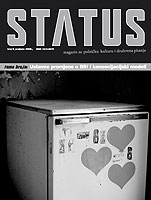The Dayton Supermarket: ustavne reforme u simulacijskom ključu
The Dayton Supermarket: constitutional reforms in the key of simulation
Author(s): Eldar SarajlićSubject(s): Politics / Political Sciences
Published by: Udruga građana »Dijalog«
Summary/Abstract: The author couches its critique of Dayton in the following terms: 'Political dysfuncionality, as an experiment of a sorts, has been raised to the constitent status – the very ambiguity has been established as a social raison d'etre. Time is relativised, history (as a collective experience of the past) is declared non-existent, particular, ethnic histories are universalised as existential narratives and the presence of very deities within time; such an ethnic politheism is a perfect and postmodern reference to both premodernity i the contradictions that such a constitution of public consciousness meets in democratic and liberal environment.... hence, the Dayton agreement has determined Bosnia-Herzegovina as a post-modern country.' This is why the author believes that the recent negotiations on constitutional amendments, founded on Dayton, represent a mere simulation and have but a symbolic value. To a large extent, he assigns blame for such a state of affairs to the international community. He claims that it is clear that the international factor does not recognise, or perhaps does not want to recognise, such simulation. He has in mind primarily a constant contribution to the maintaince of the illusion about not only a political functionalism but also the existence of Bosnia-Herzegovina as an international personality. 'I may be sociologically blind, or my perception may be distorted through a wrong education, or something else, but I do not see Bosnia-Herzegovina, though I have been told that I live in it.' In the author's opinion, the international community, by which he means not only the OHR or the European Commission, but also a series of so-called 'non-governmental organisations', on a daily basis drips a certain dose of simulational infusion into into the BiH society, reproducing time and again a code at the level of which nearly vain political lives of the citizens of the BiH have been maintained; the doze concerned is a well-known dose – from declaring the nationalist forces to be democratic deities up to playing the role of stepmothers to the talks on constitutional reforms in the BiH. The author, however, is of the opinion that Bosnia-Herzegovina today needs a symbolic revolution, a radical transformation of society based on a radical alteration of the symbolic matrix through which the BiH is both lived and viewed.
Journal: STATUS Magazin za političku kulturu i društvena pitanja
- Issue Year: 2006
- Issue No: 09
- Page Range: 141-155
- Page Count: 15
- Language: Bosnian

